Want to know all about plastic waste in the environment and in the oceans? Then you've come to the right place! No matter whether we are at the beach, in the city or in rural areas - our plastic waste is now everywhere!
A single piece of plastic left behind in nature may seem so insignificantly tiny - but it can turn into a nightmare for the environment and wildlife. And unfortunately, it doesn't stop at just one piece of plastic. Between 4.8 and 12.7 million tons of plastic end up in the sea every year alone.1
In this article, I would therefore like to show you why we are facing a plastic crisis, the consequences of plastic waste in the environment and what we can all do about it together. Let's go!
Background: What is so problematic about plastic waste?
Why is plastic waste in the oceans actually one of the most biggest environmental problems of our time? After all, the plastic is light, heat-resistant, inexpensive and extremely versatile. But in addition to these Advantages is plastic above all not biodegradable! The material is persistent due to its chemical composition and remains forever.
Man-made plastic waste in the sea decomposes itself only by salt water, wind and weather over many years to smaller Microplastics. However, our plastic waste disposed of in nature will never disappear completely.
And this is precisely the decisive fact that single-use plastic in particular is nowadays a Icon our Throwaway Society is.
How long does it take for plastic waste to decompose in the oceans?
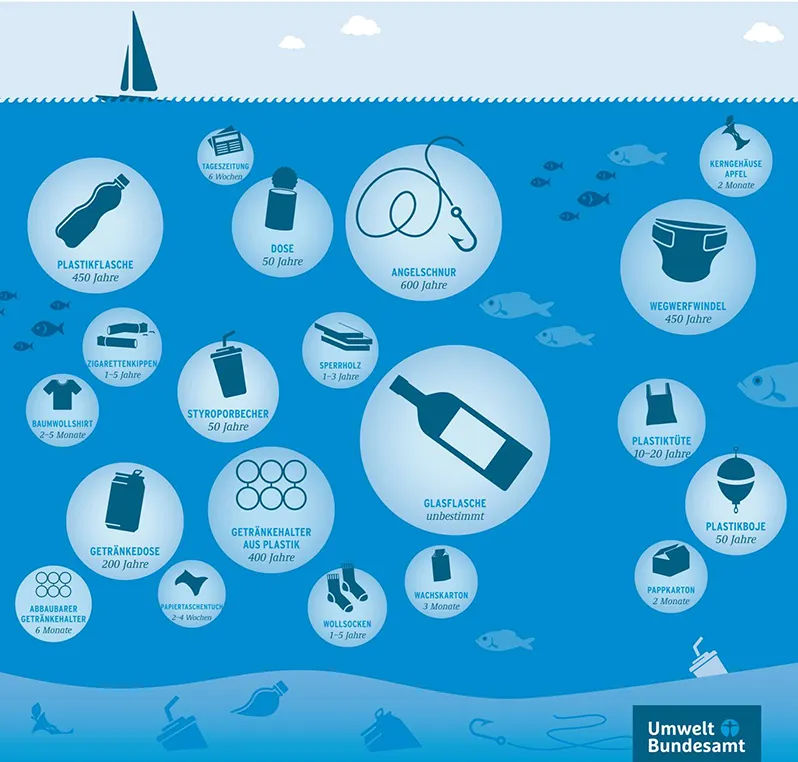
A plastic bottle, for example, takes almost half a millennium to decompose, a polystyrene cup half a century and a plastic bag around 10-20 years. Many of these everyday objects carelessly left behind in the environment may therefore remain there. longer than we have walked this earth.
How much plastic waste is in the oceans?
According to the Federal Environment Agency between 100 and 142 million tons of waste in the oceans. Around 70 percent sinks to the sea floor, 15 percent washes up on beaches and another 15 percent floats on the surface and in the water column.2 Round 75 percent of the total amount of waste are said to be plastic waste.3
According to forecasts, by 2050 there could ultimately be more plastic floating in the sea than there are fish.4
What are garbage swirls?
Among the Garbage swirls in the sea is the term used to describe large accumulations of waste in the oceans caused by ocean currents. The largest whirlpool is the so-called "Great Pacific Garbage Patch" in the North Pacific. It is estimated that between 79,000 and 129,000 tons of plastic waste have accumulated over an area of around 1.6 million square kilometers.5
Tip: At Plastic waste statistics I have compiled all the important facts and figures about the environmental problem.
Causes: Why is there so much plastic waste in the environment in the first place?
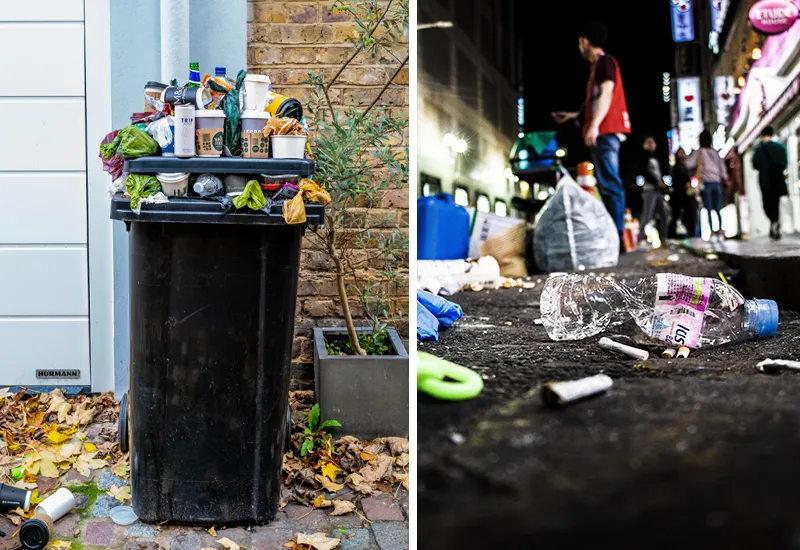
Plastic decomposes extremely slowly and basically remains in our environment forever. This property is of course crucial for the fact that we are seeing more and more plastic waste in the environment nowadays.
But the Actual reasons for plastic pollution are of course to be found in us humans and our handling of plastic.
Some of the actual causes have been compiled for you here:
- High plastic production and growing plastic consumption
- Inadequate waste management
- Lack of disposal options
- Careless littering and inadequate Environmental Education (see also Littering)
- Disposals from shipping or fishing (e.g. ropes and nets)
Ultimately, waste from the mainland can end up in the sea via the wind and, not least, rivers. Since Microplastics from cosmetics or clothing fibers not filtered out in sewage treatment plants can be disposed of, the mini-plastic also finds its way into the oceans via domestic drains and watercourses.
The list of causes could basically be continued indefinitely. For example, the Mass Tourism contribute massively to plastic waste in the environment. Can you think of any other reasons for litter in nature? Then please write me a comment.
Consequences: What damage is plastic waste doing to the environment and the oceans?
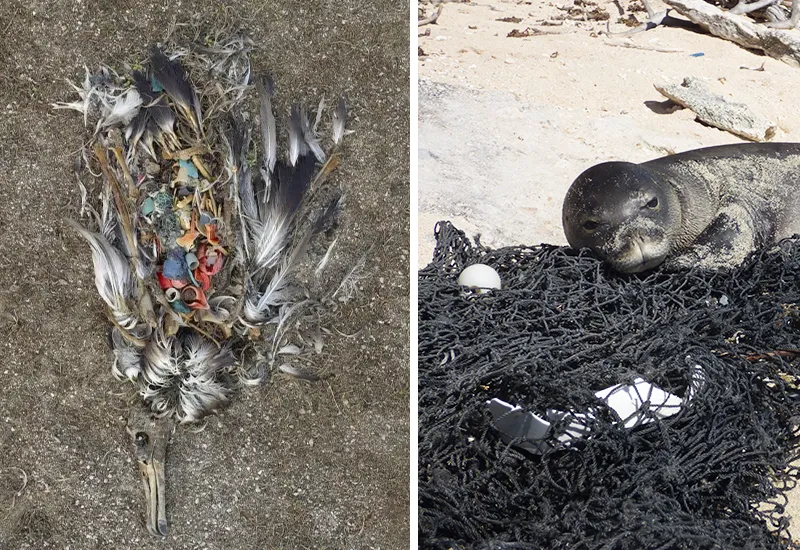
As small as the plastic particles appear, they are They are also dangerous for ecosystems, wild animals and, last but not least, for our own lives. I would therefore like to show you briefly and concisely why we all urgently need to do something about plastic waste in the environment.
Plastic waste kills animals and destroys habitats
NABU estimates that every year around 135,000 marine mammals and one million seabirds die from the plastic waste we humans leave in the environment.6 Incredible figures, but not surprising.
Because the animals think the plastic particles are foodThey eat them and then starve to death in a stomach filled with plastic. Bird species such as gulls and gannets even build their nests and often strangle themselves in agony. Last but not least, it is whales, dolphins, turtles and many other marine animals that usually become entangled in old fishing nets and drown as a result.
For these reasons, our plastic waste in the environment also contributes massively to global warming. Species Extinction with. As (micro)plastic is the Susceptibility of reef-building corals to diseases the waste can even destroy entire habitats.7
Plastic waste harms the economy
Our plastic waste in the sea also affects us. As a result, the decline in fish stocks naturally affects the yields of Fishing industry.
And the income from the Tourism in coastal areas suffers from the unsightly plastic pollution of beaches and waters.
Last but not least, the Costs for cleaning up the environmental damage with every piece of plastic thrown away. These are just a few of the many economic reasons to actively combat the plastic crisis.
Plastic gets into the food chain
Since fish, crabs and other Animals from the marine world that eat plastic particlesthe Plastic also enters the food chainuntil it finally ends up on our plates again. The health consequences we can expect are still largely unexplored.
However, the damage and changes observed in the metabolism of the animals studied, which also affect their Life expectancy and reproduction already give food for thought.8
Solutions: What to do about plastic waste in the environment and in the sea?
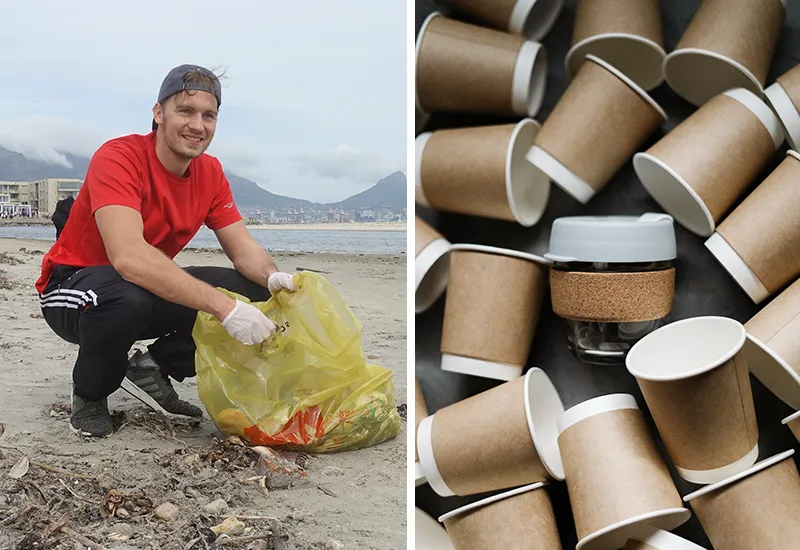
Motivated enough? Then let's take a final look at what we can do about plastic waste in the environment! Here are some Things that each of us can implement in our own everyday lives.
Making your own everyday life (more) plastic-free
It must be the goal, produce less plastic waste. And through the most plastic-free lifestyle it can be achieved. Here are some easy ways to get started:
- Collect and evaluate your own waste for a week (to identify potential savings)
- Focus on reusable alternatives for disposable products (e.g. such reusable straws made of glass*instead of plastic straws)
- Consume more consciously (e.g. only buy what you really need)
- Buy food loose instead of packaged in plastic (e.g. buying apples without plastic packaging or bags)
Tip: You can find even more inspiration in the article about the Zero Waste Lifestyle and the Zero Waste Tips.
Dispose of plastic waste properly
Of course, plastic waste cannot be completely avoided! However, the waste you generate in your everyday life should be at least put them back into the recycling loopso that natural resources conserved be
Simply contact your local waste disposal company for more information about the proper waste separation. Plastic waste usually belongs in the yellow garbage can. The use of regional deposit systems also helps to combat plastic waste in the environment and in the world's oceans.
Actively campaigning against society's plastic craze
Making a real difference in your everyday life is great. With the Demand for plastic-free alternatives you ultimately also increase their offer.
If you want to increase your impact even furtherbut you can also get actively involved in our society. Here are some ideas to inspire you:
- Take part in waste collection campaigns. (e.g. at forest or beach clean-ups)
- Erive awareness of the plastic problem. (e.g. among friends or at work)
- Save animals in need because of plastic waste.
- Take part in public discussions and campaigns against plastic pollution.
- Start or sign petitions. (e.g. for a ban on single-use plastic)
- Actively or financially support projects, organizations and companies that actively combat plastic waste. (e.g. via crowdfunding or your demand)
Tip: At Projects against plastic waste I present some creative ideas that are already successfully tackling the environmental problem.
Combat plastic waste in the environment in your own everyday life!
We all need to rethink so that plastic waste doesn't end up in the environment in the first place. Plastic does not decompose, kills animals and ultimately harms our health. By consciously plastic-free or at least plastic-free lifewe help ourselves and the environment in which we live.
As far as the existing plastic waste in the environment is concerned, we only have one option, Support existing projects and become active themselves. If you like, you can join our worldwide Beach CleanUp group on Facebook and share your own CleanUp actions with the world. I would be delighted!
"The world changes by your example, not by your opinion."
Paulo Coelho (more at Zero Waste Quotes)
Has this article helped you to better understand the problem of plastic waste in the environment? And do you have any questions, suggestions or further tips on how to do something about it? Then I look forward to your comment either way!
Stay clean,

PS: If you'd like, I can show you Bathroom without plastic Next, find out directly how you can produce significantly less plastic waste in the bathroom. Good luck!
References:
- WWF Germany: No sea can swallow this anymore: Our oceans are drowning in plastic waste (as of 08.12.2023), available at https://www.wwf.de/themen-projekte/plastik/plastikmuell-im-meer. [31.01.2024]. ↩︎
- Federal Environment Agency: What quantities of waste are in the oceans? (as of 08.09.2017), available at https://www.umweltbundesamt.de/service/uba-fragen/welche-abfallmengen-befinden-sich-in-den-meeren. [31.01.2024]. ↩︎
- Federal Environment Agency: Marine Litter (as of 29.09.2015), available at https://www.umweltbundesamt.de/themen/wasser/gewaesser/meere/nutzung-belastungen/muell-im-meer. [31.01.2024]. ↩︎
- ZEIT ONLINE: Environmental pollution - More plastic than fish in the sea in 35 years (as of 19.01.2016), available at https://www.zeit.de/wissen/umwelt/2016-01/plastik-umweltverschmutzung-meer-studie-weltwirtschaftsforum. [31.01.2024]. ↩︎
- L. Lebreton, B. Slat, F. Ferrari; et al. (2018): Evidence that the Great Pacific Garbage Patch is rapidly accumulating plastic, available at https://www.nature.com/articles/s41598-018-22939-w.pdf. [31.01.2024]. ↩︎
- NABU: Plastic waste and its consequences - Waste threatens birds, dolphins and co, available at https://www.nabu.de/natur-und-landschaft/meere/muellkippe-meer/muellkippemeer.html. [31.01.2024]. ↩︎
- C. Seidler: Plastic waste in the sea - Yoghurt pots are currently destroying a reef (as at: 26.01.2018), available at https://www.spiegel.de/wissenschaft/natur/korallen-so-leiden-riffe-unter-plastik-muell-im-meer-a-1189636.html. [31.01.2024]. ↩︎
- H. Koch: Hormone diseases caused by plasticizers (as of 19.03.2010), available at https://www.endokrinologie.net/pressemitteilungen-archiv/100319.php. [31.01.2024]. ↩︎

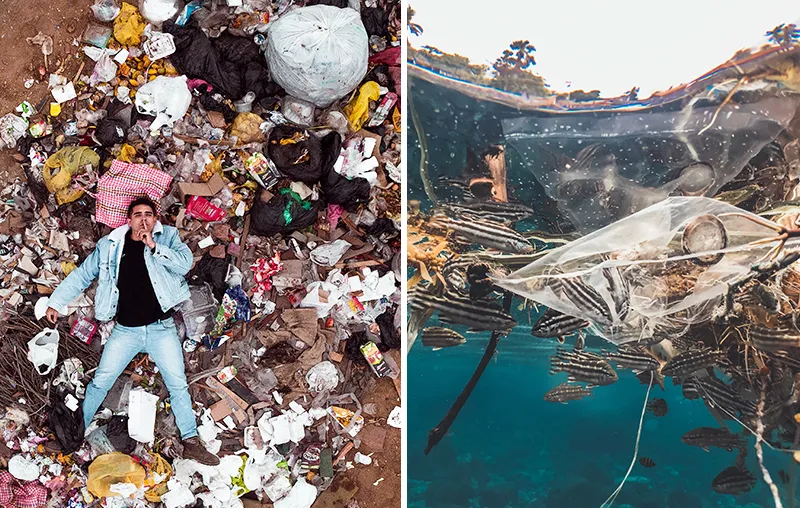

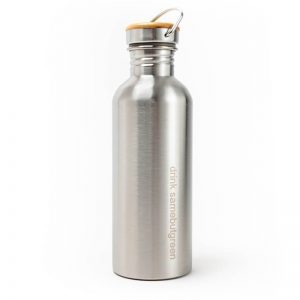






Hello Christoph.
What question has been bothering me for years is. What happens to the garbage collected? Where does it end up? Again sea, since the recycling yards do not follow?
Hi Sarah. There is a trustworthy organization in almost every country that recycles garbage. Sometimes it is a bit smaller, but sometimes it is amazingly big. In Bali, for example, I paid some money to have EcoBali pick up the trash and recycle it. Glass bottles were even upcycled into cool glasses.
Best regards
Christoph
Dear Friends of the Earth!
I am always happy about this website, about your commitment, your creativity, your passion for our Blue Planet! You are a great light of hope in the dark chapter of humanity "consumer society".
Here I would like to post a little story that I so happened to experience on the street in Munich, which I think sums up the whole dilemma. Have fun reading:
StreetArt - We have only the one earth
No longer useful for anything else, the frail grandmother, toothless, neglected, with greasy hanging grayish yellowed hair, had been pushed in a scrapped wheelchair onto a busy square in the pedestrian zone to beg, so that at least, if she could contribute nothing else, she could still exploit her miserable sight. It looked as if someone had placed his bulky waste on the street with a note "to take away". The little mother stared absently at an old newspaper, in scrap paper, which she held on her lap between her shaky hands in front of her. Hanging from the back of one of the wheelchair's handles was a scuffed plastic bag containing yet more scrap paper.
The plastic bag came from a drugstore that likes to present its corporate culture as not only customer-friendly, but also particularly environmentally friendly and sustainable. But what irony - whose name, consisting of two letters, could also be read as an abbreviation for "Dein Müll" ("Your garbage"). Or as an inquiry into the environmental friendliness on display: And your garbage?
On the colorful plastic bag with sun and rainbow was the confusing message, because rather incompatible with the material of the bag: "We have only one earth". But maybe the message was not meant so seriously. Or only for the - others?!
There they stood, the two mothers worn to market, fellow sufferers who stood up for each other in this random street scene: The grandmother, whose old days were only a burden to her family, which was no longer profitable, so completely without a pension, and Mother Earth, whose goods are sold off and then end up on the garbage, but not before one has also exploited the self-inflicted damage by relabeling it as environmental friendliness.
This is the final consequence of our throwaway society. Our belief in ever more consumption for ever more prosperity?
First it affects the most defenseless and poorest, then it spreads like a cancer, and finally it affects us all.
Street art par excellence: a random, completely unintentional composition, unposed, temporary in both senses of the word, visible only to those who have a sense of it, a heart. Who want to see it.
Hello Karin!
Thanks for your great feedback and extra motivation.
I am very happy to publish the story here, thank you!
Stay clean,
Christoph
Hello Christoph,
I Jg. 1962 find your work that you do for the planet earth Suuuper. Unfortunately, the plastic waste but only a part of the problem of marine pollution, there would also be decades of dumping of toxic waste and radioactive substances to. Mankind will not be able to avoid spending billions to free the oceans and the entire planet from our waste. This should be initiated as soon as possible, because the researchers in honor, we will never experience the year 2050! The flyer has a mistake Uv stabilized plastics are missing, as far as I am informed need the one thousand years until they are decomposed?
Greetings from Switzerland Peter
Hello Peter, thank you for your comment. You are absolutely right, plastic waste is far from being the only problem. We still have a lot to do, because there is nothing more important than making our planet habitable for future generations.
Best regards to Switzerland,
Christoph
so i think if germany is the only one to shut down the industry it does not help the earth if all countries would have to do it then
Hi Peter! Germany is a country that must take responsibility and lead the way. We have the technologies and the know-how and the waste to process - instead we send it to Asian countries that already have a serious problem with their own waste. So we are one of the countries that need to start changing their habits. Privately but also economically and politically.
Many greetings
Christoph
I think it's really cool what you do for us and the environment I'm a WWF member myself and regularly donate to such "I call it cleanup" events
Warm regards
Andrej Vogelgesang
Hi Andrej! Thank you very much and keep up the good work. The CleanUps are waking people up here in Indonesia... 🙂
Many greetings
Christoph
Comments are closed.